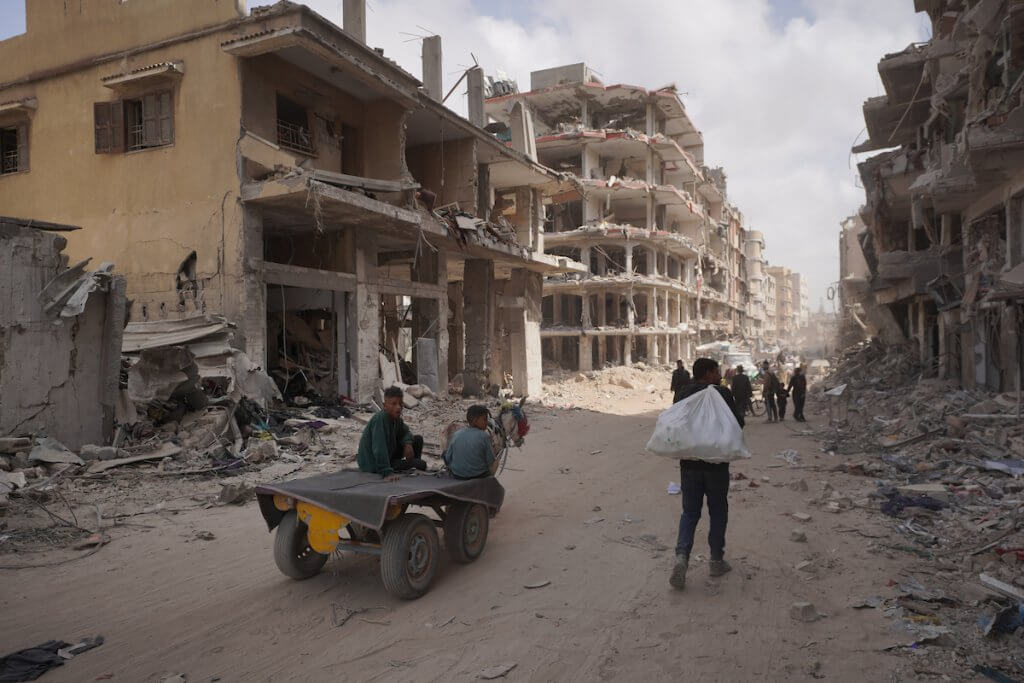With each passing day, the alarm sirens about famine in Gaza are screaming louder than ever, but the mainstream U.S. media continues to hide or downplay Israel’s responsibility for the mass starvation.
Just the other day, one of the world’s leading experts on mass hunger, Alex de Waal, said, in the Guardian: “We are about to witness in Gaza the most intense famine since the second world war.” de Waal is no ordinary commenter. He has spent decades researching and writing about famine in various parts of Africa, including Ethiopia, Sudan and Somalia, and he is known for being rigorous and cautious.
The sub-head on his article was also ominous:
Gaza’s health crisis has its own dreadful momentum. Even if the shooting ends today and the aid trucks begin to roll, the dying will carry on for some time.”
So how is the U.S. media covering this danger? In fairness, there have been some articles, especially recently. The New York Times did a front-page report on March 18, which cited a global authority of food experts who did warn that “famine is imminent” and that Gaza is on the edge of a “major acceleration of deaths and malnutrition.” Others have also covered the starvation threat.
But the mainstream media failure, which is so comprehensive and systematic that it must be deliberate, is its refusal to blame Israel for the looming mass starvation. This coverup extended across nearly all the major outlets, but one particular example in the New York Times illustrates it perfectly. Two days after its front-page article, the Times ran a long analysis which purported to answer the question: “Why Isn’t More Aid Getting to Gazans?” The report appeared thorough, and included detailed interactive maps.
In fact, the Times analysis was a model of dishonesty, meant to shift blame away from Israel, and it merits a closer dissection. Immediately, in the 5th paragraph, bias jumps out. It says “Just two entry points into the territory [of Gaza] are regularly operating, both in the south.” Here’s the truth: “Israel only allows two entry points, which are distant from northern Gaza, where hunger is greatest.”
A little further along, we learn that Israel inspects all trucks entering Gaza, and that “the inspection process is often lengthy.” Down in paragraph 16, we get more detail: The U.N. relief agency tells the paper that “convoluted Israeli inspections hold up aid.” And: “Trucks sit in miles-long lines at every checkpoint and are forced to start over if even one item inside is rejected.” Then: “U.S. and British officials have said that critical goods, such as water filters and scissors included in medical kits for treating children, are being rejected because they could be used for military purposes.”
The Times then trots out an Israeli spokesman, and gives him 3 paragraphs to deny that Israel is “preventing the flow of aid.”
That’s it! But this is precisely where good reporters would get to work. Here’s just one suggestion, and the Times wouldn’t even have to leave Israel to do it. Go to various human rights groups there. Start asking around; you will surely find people who are willing to tell you that Israel is deliberately slowing those aid trucks. Promise them anonymity, and put them in the paper. You assigned 4 reporters to this story. Surely you have enough people to do the legwork.
What’s more, nowhere does the long Times analysis explain that Jewish supremacists on the Israeli side of the border are also blocking the aid trucks from crossing into Gaza.
The Times moves on, and finds yet another way to downplay Israel’s responsibility for the famine: “The threats of desperate crowds and Israeli gunfire make the transfer of food to people dangerous.” It repeats its coverup of the February 29 Flour Massacre, in which more than a hundred Gazans died. It first cites Israel’s explanation, that most victims died in a stampede, and only then says there was “shooting by Israel forces.” You decide.
Right toward the end, the Times says that the U.S. promise to build a pier to unload food aid and other supplies will take 2 months, and notes, without comment, that “Gaza does not have a functioning port.” Which country prevented Gazans from constructing such a port?
The Times pattern of exonerating Israel by deploying both sides bias is repeated in other outlets. For instance, the PBS News Hour quoted an Israeli spokesman’s denial that it is slowing the aid before even letting a UNICEF official make the allegation. National Public Radio followed the same playbook, although it did at least contact Alex de Waal for a report.
But arguably the worst offender, unsurprisingly, was CNN. It ran a 4:16 report (on CNN International, not the more popular U.S. version), which did show Gazans who are hungry. But, astonishingly, CNN only had one single sentence suggesting that Israel was causing the famine. Here (at 2:16) is what CNN said: “Israel is accused of using starvation as a weapon of war, something it denies.” The Guardian’s recent report about the extraordinary bias at CNN is obviously still valid.
(The Washington Post, to its credit, was an exception to the whitewash. Back on March 3, Claire Parker’s headline said: “How Israel’s restrictions on aid put Gaza on the brink of famine.”)
Back to the long Times analysis. It probably regrets that it allowed comments. Here were 2 of the top “Readers’ Picks:”
“A lot of words in this article that don’t say the obvious: Israel is intentionally starving these people and preventing aid from entering.”
And:
“This article is unbelievable. Every single aid agency — and I sincerely think this is without exception — has stated that the problem with getting aid into Gaza is ISRAEL.”
(This site ran a long comprehensive post on “how Israel is engineering famine in Gaza.”)



Today’s NYT has a reasonable article on the difficulty of finding the dead under the rubble of Gaza:
https://www.nytimes.com/2024/03/23/world/middleeast/gaza-missing-bodies-deaths.html
It still has some questionable aspects. I was struck by how none of the reporters is based anywhere near Gaza and they appear to be mainly viewing material on social media and summarising it for readers.
I balked at this sentence: Gaza has been under a debilitating blockade jointly enforced by Israel and Egypt since Hamas took control of the strip in 2007, and the types of equipment typically used to rescue people after earthquakes and other events of mass destruction are largely forbidden from entering the territory”, which makes it appear that Egypt is equally responsible for the situation. Plus the characteristic journalists’ use of the passive voice to avoid saying who is doing the forbidding.
The Guardian covers this better:
One graphic lists the old entry points and the year of their closure/destruction by Israel:
https://www.theguardian.com/world/2024/mar/22/obstacles-to-gaza-aid-deliveries-visual-guide
Oh, dear. Here’s a quote from another NYT report today:
https://www.nytimes.com/2024/03/23/world/middleeast/gaza-israel-rafah-un-guterres.html
Now that is shamefully dishonest.
I’ll reserve judgment on the veracity of any claims for now. Lets just say that the USA has partnered with Israel in manufacturing self-serving rumors of a port in Gaza in the past.
Gaza Seaport
Construction of a seaport can commence. The GoI will undertake to assure donors that it will not
interfere with operation of the port. The parties will establish a U.S.-led tripartite committee to
develop security and other relevant arrangements for the port prior to its opening. The 3rd party
model to be used at Rafah will provide the basis for this work.
— Agreed Documents on Movement and Access from and to Gaza: Agreement on Movement and Access Agreed Principles for Rafah Crossing 15 November 2005
https://peacemaker.un.org/sites/peacemaker.un.org/files/IsraelOPt_AgreedDocumentsOnMovementAccessGaza2005.pdf
I learned from reports via Reuters, The Guardian, and BBC that “The head of the U.N. Palestinian refugee agency (UNRWA) said on Sunday Israel had informed the U.N. that it will no longer approve UNRWA food convoys to the north of Gaza.” So far, I have not seen or heard any mention of this in the major U.S. MSM outlets that I have checked. I’m not saying it hasn’t been mentioned somewhere, but so far I haven’t seen or heard it. I watched the first hour of ABC news this morning, but unless I missed it, there was nothing about Gaza, or Ukraine either for that matter; just Trump, sports, U.S. reporter in prison in Russia, weather, etc.